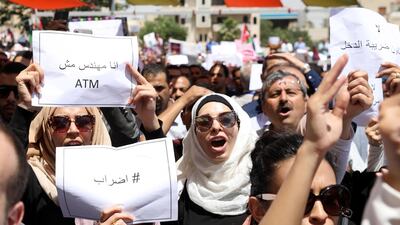Nationwide strikes in Jordanian cities this week, during which some protesters waved placards accusing the government of corruption and profligacy, follow a host of IMF-led economic reforms.
These include a 16 per cent sales tax, fuel and bread price increases and most recently an income tax overhaul, aimed at curbing Jordan's spiralling debt – currently 95.8 per cent of GDP. But amid rising poverty, unemployment and discrepancies between rich and poor, ordinary Jordanians are feeling the pinch. By significantly lowering the income tax threshold, it is the middle classes – the backbone of the nation's economy – that will be hardest hit.
The government and IMF should remember that austerity is only half the fight; it must be accompanied by an attempt to foster long term non-oil growth within the country.
There is nothing new about this tale. Discontent fizzed in Egypt last year after an IMF deal led the government to slash fuel subsidies. South American countries are still dealing with the consequences of heavy borrowing in the early 2000s; just this year, anti-IMF protestors took to the streets in Argentina.
Given the emphasis international lenders place on punishing austerity, their irritation is not entirely unfounded. Tightening belts can only take an economy so far and steps need to be taken to foster domestic growth and entrepreneurship. Only then can long term economic stability arise.
Moreover, given that in times of hardship people tend to squeeze those beneath them, a safety net is essential to provide for the poorest. Today, technology can play a role in delivering means-tested assistance. But ultimately it falls to governments and central banks to exercise sound economic judgement. While austerity-driven lenders are an easy target, crippling public debt usually has its roots in fiscal imprudence.
Unlike some of its wealthier neighbours, Jordan is today unable to cushion the blow when economic crises strike.
The gruesome 7-year war in bordering Syria, which has sent more than 650,000 refugees spilling into Jordan, has contributed to its current malaise. And amid economic inertia in recent years, poverty and unemployment have risen.
Against such a backdrop, Jordan cannot hope for a instant economic turnaround under IMF stewardship, while its reforms will remain deeply unpopular. But like Egypt, it can hope to emerge from its current crisis and look to a stable economic future.

